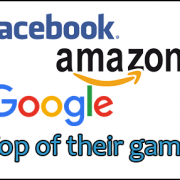Big companies dominating web space
The “Big Three” dominating web space
Think of website searching and what name springs to mind? – Google
What about social media? – Facebook
Online selling? – Amazon
Despite the best efforts of IT innovators, these three effectively now dominate their niches, far outstripping the likes of Bing, Snapchat, Instagram and WhatsApp. In fact, Facebook now owns both Instagram and WhatsApp.
There is also speculation among tech experts that Google may be preparing to buy Snap, the company behind Snapchat.
According to BBC Tech correspondent Rory Cellan-Jones, the dominance of the big three means that while LinkedIn, Twitter and Snapchat will have substantial audiences they will struggle to make much money.
What does this mean for businesses and marketing?
Leaving aside LinkedIn, which is owned by Microsoft and is a specialist niche for businesses and organisations for both conversational groups and for recruitment, business marketing will need more than ever to have a presence on both Facebook and Google.
This means paying attention to SEO (Search Engine Optimisation) so that the business’ website is easy to find when its service or product is being searched for.
It means regularly updating website content, something Google particularly now monitors and for those businesses selling services that may not change dramatically or often, unlike products, one of the best ways to do this is to add regular blogs on topics of interest to potential clients and customers.
It means that businesses should understand who their target customers are, what motivates and interests them, and cater to their requirements.
It also means defining clear goals for any marketing on social media, which is often about creating an identity so that potential clients and customers remember the company’s name and see it as having a solid reputation for the quality of its customer service and reliability.
It also means developing a trustworthy reputation, so that there are secure means of making payment online, if appropriate, and a very clearly-stated policy of conforming to the new rules due to come into force on 25 May 2018 (GDPR – General Data Protection Regulations) on protecting people’s personal information.

